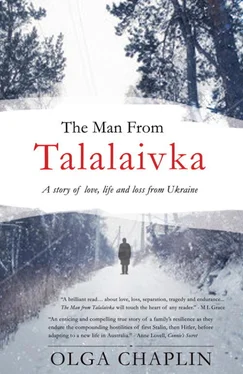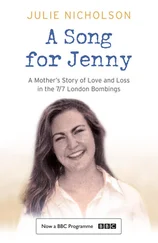As the transport truck swerved routinely into the Heidenau camp grounds, Peter jumped and strode quickly to the barracks block that housed his family. Immediately, he sensed danger. The tiny partitioned room was semi-darkened by a blanket, Mykola and Nadia watching, mute. Evdokia, tending to Ola, looked up, began crying again. Their child was moaning, in pain. Peter rushed to her side, felt the feverish little body. Ola had seemed better, was subdued, at daybreak. He had prayed, when he left for the Ostend forest work, that she would overcome her illness. Her condition had worsened these past days, was now severe. The rock thrown as she passed a group of older children, in child’s play that descended into stone-throwing, had inadvertently found its target.
“Petro, Petro,” Evdokia’s streaked eyes pleaded, “she is listless… she cannot eat, or even drink… She looks at me the way Manya did…” She sobbed quietly, wiping her youngest child’s brow with the damp cloth.
Peter’s skin pricked with alarm. He sensed there was no time to lose. The nearest hospital was Hamburg, which was still dilapidated but was equipped with surgeons experienced in emergencies. The Tosted forest labourers were sent there with serious injuries. There was nothing the camp medical attendant could do for their child: the area surrounding her left ear was red-purple, needing urgent attention, possibly even delicate surgery. He gently picked Ola up, her feverish body silent, and carried her swiftly to the camp commandant’s office.
“Herr Pospile… Frau Pospila… what has happened?” The commandant’s aide rushed forward as Peter pleaded to speak with his senior. At the commotion, the commandant opened his office door. He saw at a glance the panicked parents and their sick child, understood sufficient of Peter’s pleas in fractured German to gauge the urgency. He had witnessed many of these dire personal calamities, was seasoned to discriminate understandable parental concern from serious emergencies. And these times were different, too. In the early days of this Heidenau camp this child almost died twice, through infection and accident. Only the ministrations of an experienced German nurse saved such children in the dark days of 1945, before reconstruction had fully begun.
He signalled to his aide to order his vehicle to the door and instructed Peter to sit beside him. Evdokia, knuckles white with tension, cried silently as she caressed Ola, comforting her youngest with the precious Red-Cross-parcel shawl sent from a far-off kindly place.
Gravel potted road gave way to more efficient roadways as they neared Hamburg. Despite his daughter’s suffering, Peter observed the changes taking place in this new Germany, the speed with which rubble had already been cleared, and used, for buildings in reconstruction work. “Gute arbeit,” he heard the camp commandant murmur to himself. The work, admittedly forced on the inhabitants of the defeated nation, now had Allied aid from all parts of the globe. Peter could not help but admire the application of these people to the task before them, could not help but compare Stalin’s decimation of his Ukrainian homeland, even before one German soldier’s boot had stamped on its soil.
The irony hit him that here he was, travelling in a German commandant’s vehicle, nearing the hospital in which a German surgeon would be asked to save his child’s life, a child born in the heat of the worst bombing Europe had ever experienced. Tears fell uncontrolled down his face. “Dae Boje nam,” he prayed silently, for all the lovers of humankind. He turned his face away, his tear for humanity scorching his parched cheek, cleansing it. It would take another miracle for his child’s life to be saved, and he and Evdokia had already had their share of miracles in their life’s struggles up to this time. All he could ask of the German surgeons was to do their best for his child. This, he felt hopeful, with his veterinary training and having watched life come and go, is what they would attempt to do.
With only minutes to spare, his inked signature still wet on a consent document, the doctors rushed little Ola to the operating room. Memories of their long night vigil at Manya’s side rushed to sap at his emotions. He drew Evdokia closer to him, put her delicate shawl around her shoulders. Tragedy brought them close together again, their pulse beating as one, silent prayers appealing to the same God.
Some time later, the surgeon appeared and beckoned them to his office. Too early to yet know, he was hopeful of their child’s recovery: the septicaemia had been arrested, due to quick action and the surgeons’ skills. The doctor, dark hair smoothed and in a clean white jacket, took out a decanter and two thimble glasses, poured the black market vodka for Peter and Evdokia. He watched, with serious brown eyes, as Peter drank the vodka medicine. The medicinal vodka was good; too good. Its anaesthetic effect, blunting his pain, etched and imprinted in his mind, from that moment on. His saviour, henceforth, was not just his Orthodox God, but a pure spirit of fire aiding his faith that was man-made, readily available in time to come, the crutch which blurred the senses, hid the vulnerabilities. He could not know it then, but the sensation of that moment, the relief it brought to his jagged emotions in the uncertainty of his daughter’s recovery, was a moment too well remembered, too well learnt.
Gratitude to the doctor before him overwhelmed him. He knew, in his heart, this would not have happened in Stalin’s Russia. For all the spiel of Stalin’s ‘new nationalism’ in driving out Hitler’s armies, the Ukraine would continue to suffer under Russia’s yoke, never to be given equality for the duration of Stalin’s life.
* * *
Peter knew, as he nightly watched Evdokia prepare their simple meals in their too-cramped quarters of the ex-army barracks, and as their little Ola gradually regained her strength, that they had somehow, miraculously, come out of a blackness, the nightmare of the horror war years, and of their anxieties spanning almost two decades. In spite of their post-war difficulties, as ‘displaced persons’ without status or country, he felt a deep optimism. And that optimism stemmed, not from wealth or land or possessions, but from the outstretched hands of humanity, from the most unexpected quarters, to help them rise to their feet, raise their spirits and look to the future, to find those intangible, best things in life through this humanity, which transcend money, and power, and dogma. He hoped passionately he was right. His heart told him so. His head, given his life’s experience, cautioned him still.

Chapter 33
Even as the work truck wound its way back to the camp commandant’s office, Peter sensed the tension of the disparate group of men mutely waiting as the commandant’s aide secured the new list to the board. His stomach felt pitted with anxiety and anticipation, perspiration pricking him. He wiped his dusty face again. It was another warm summer Saturday, yet he felt cold, clammy. He forced his work-weary boots to the board, his stomach tensing again as mixed cries of anguish and elation spread through the group. He did not know how long he could bear this continued, prolonged waiting. He had had to steel himself for months, now. Time was running out, he knew. Most of his friends already had their interviews confirmed. Their youth, his age, little Ola’s illnesses, must have worked against his chances.
The men had already dispersed before he reached the board. He knew what this meant: it was a short list, this time. Whatever the problems experienced by the UNRRA, the United Nations Relief and Rehabilitation Administration office from the Munster region, the length of each monthly list and the haphazard selection of names was never explained, and could not be questioned.
Читать дальше













